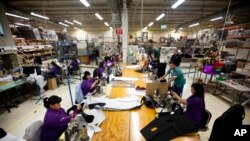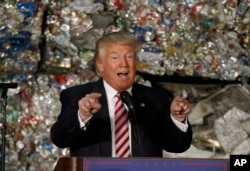President Donald Trump has called the North American Free Trade Agreement "the worst trade deal ever," and promises to either renegotiate it or trash it.
Supporters of NAFTA say it more than tripled U.S. trade with Canada and Mexico, the first- and third-largest U.S. trading partners. Critics say the deal sent a surge of U.S. manufacturing jobs to Mexico, where companies took advantage of lower wages.
Economists, however, say NAFTA had less impact than supporters promised or critics feared because North American trade is such a small portion of the U.S. economy.
The deal went into effect in 1994, cutting most tariffs on goods traded among the three nations and easing regulatory and other barriers to trade. NAFTA focused on agriculture, textiles and auto manufacturing, and sought to protect intellectual property and establish ways to resolve disputes. Side agreements were supposed to implement labor and environmental safeguards.
Economists say trade deals are sometimes politically unpopular because job losses are concentrated in certain industries and cities, where those hurt by the change speak out forcefully. The benefits of these deals may be larger than the losses, but the gains are spread through the wider economy, making them harder to see and less useful in political arguments.
Trump's nominee for commerce secretary, Wilbur Ross, told a congressional committee that NAFTA will be a "very, very early topic in the administration."
While Washington could give notice and withdraw from the deal, a New York Times analysis says it is more likely that the Trump administration would push for rules requiring more parts of products to be manufactured in the member nations. Another possibility: Allow more goods to be shipped into Canada and Mexico from the U.S. without taxes or paperwork. A more controversial approach would change the ways that value-added taxes are levied on U.S. exports.
Trump also has threatened to slap a large tariff on certain imports from Mexico which, according to a report in the Detroit Free Press, could add $2,000 or more to the cost of a car.





